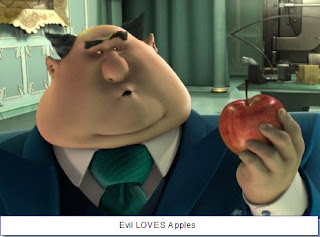 If you're not familiar with Little Nicky, here's the low-down: The mentally-challenged son of the devil goes to New York to capture his brothers to bring peace back to both Earth and Hell. Personally, I think it'd have been funnier if his name was Little Luci (you know, as in Lucifer), but if I had the good ideas I'd be in Hollywood making movies like Little Luci.
If you're not familiar with Little Nicky, here's the low-down: The mentally-challenged son of the devil goes to New York to capture his brothers to bring peace back to both Earth and Hell. Personally, I think it'd have been funnier if his name was Little Luci (you know, as in Lucifer), but if I had the good ideas I'd be in Hollywood making movies like Little Luci.At first glance, this movie doesn't have a whole lot to think about, let alone overthink about, but a closer examination reveals a fairly complex set of laws governing Heaven, Hell, and Earth.
We begin the movie with Jon Lovitz doing what Jon Lovitz does best, being creepy and peeping at a woman undressing. Tragedy strikes as Jon Lovitz dies and ends up stumbling out of the portal to Hell. He's greeted by Kevin Nealon and given his punishment, which is to be comically raped for eternity. Remember, rape is always funny if it's a guy. This is pretty straightforward, if you're a bad person and you die, you get an appropriate punishment. While I wouldn't exactly say peeping is equal to eternal rape, this IS Hell we're talking about.
We're then introduced to the ruling family of Hell, with the ruler of Hell about to announce his successor. The audience is lead to believe that all three sons would make terrible rulers. Two of them are incredibly sadistic and evil, and the third (Nicky) is dumb as a brick. The devil comes to the conclusion that the only good choice for successor is himself. This raises an interesting fact about this Hell. It's not about being evil as possible (as one might think), but rather being fair, wise enough to judge the souls, and just sadistic enough to enforce those punishments.
The two brothers, enraged at this turn of events, decide to go to Earth and basically cause as much trouble as possible for everyone. They run through the portal which instantly seals it up, preventing new souls from entering Hell. This slowly weakens and kills the devil, so it's important that someone goes up to Earth to round them up and bring them back.
The implication here is that it seems ridiculously easy to destroy hell. All an entreprenuring demon, or possibly a damned soul, would have to do is run through the portal and hide out a little bit. It's shown in the movie that there's no real way of tracking the escapees. It's only because their escapades are blatant that Nicky is able to find them. Being that hell is aeons old (it's mentioned that the current devil has been reigning for 10,000 years), it's remarkable no one has tried it yet. Seems like the first thing you'd want to do is escape, and with only one Kevin Nealon guarding the entrance, it'd be pretty easy to do. I guess the denizens of hell are more law-abiding than they're given credit for.
As the movie unfolds and the population of New York effectively becomes a horde of sin and evil (with pretty minimal provocation), my one question is this, "What is heaven doing during all of this?" Heaven is shown to be a very real thing, and yet intervention on heaven's part is completely absent. I would think that the forcible corruption of a metropolitan area by hell would be more than enough reason to come down and protect the flock. This leads to only one conclusion: Heaven doesn't care.
Heaven definitely has an exclusive country club-like atmosphere and it seems that God (I would assume) is perfectly happy keeping it that way. If a bunch of miscreants are going to go sin themselves into hell, just let them. More cloud space to park the new BMW hybrid he just bought.
So, to live in the world of Little Nicky is to live in a world with a fragile hell and an apathetic heaven. A world were minor infractions are met with brutal consuquences, and demons are always vying for your soul. There's no angels to combat them, heaven would just as well not have you.
It's a bleak world out there. Good thing we have a retarded Adam Sandler to protect and guide us.
Zel-kun out.


 Stuart does what any scientist would do and leaps through a wormhole he predicted without telling anyone. He then proceeds to take pictures and look incredibly conspicuous. He then attracts the attention of Leopold, who chases him back through the return wormhole.
Stuart does what any scientist would do and leaps through a wormhole he predicted without telling anyone. He then proceeds to take pictures and look incredibly conspicuous. He then attracts the attention of Leopold, who chases him back through the return wormhole.
